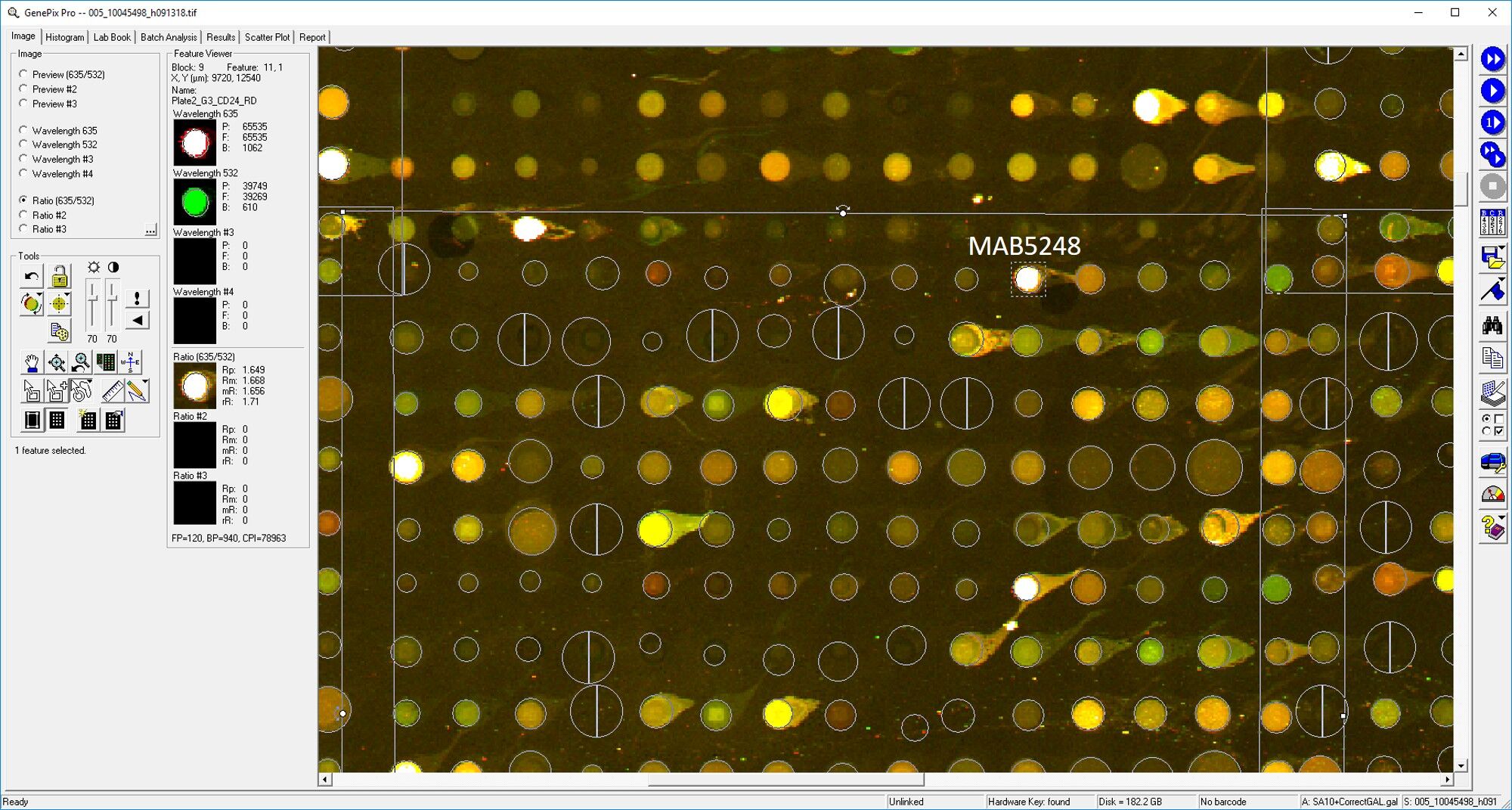Human CD24 Antibody Summary
Ser27-Gly59 (predicted)
Accession # P25063
Applications
Please Note: Optimal dilutions should be determined by each laboratory for each application. General Protocols are available in the Technical Information section on our website.
Scientific Data
 View Larger
View Larger
CD24 in Human Colon. CD24 was detected in immersion fixed paraffin-embedded sections of human colon using 15 µg/mL Human CD24 Monoclonal Antibody (Catalog # MAB5248) overnight at 4 °C. Tissue was stained with the Anti-Mouse HRP-DAB Cell & Tissue Staining Kit (brown; Catalog # CTS002) and counterstained with hematoxylin (blue). View our protocol for Chromogenic IHC Staining of Paraffin-embedded Tissue Sections.
 View Larger
View Larger
CD24 in Human Ovarian Cancer Tissue. CD24 was detected in immersion fixed paraffin-embedded sections of human ovarian cancer tissue using Human CD24 Monoclonal Antibody (Catalog # MAB5248) at 15 µg/mL overnight at 4 °C. Tissue was stained using the Anti-Mouse HRP-DAB Cell & Tissue Staining Kit (brown; Catalog # CTS002) and counterstained with hematoxylin (blue). View our protocol for Chromogenic IHC Staining of Paraffin-embedded Tissue Sections.
Reconstitution Calculator
Preparation and Storage
- 12 months from date of receipt, -20 to -70 °C as supplied.
- 1 month, 2 to 8 °C under sterile conditions after reconstitution.
- 6 months, -20 to -70 °C under sterile conditions after reconstitution.
Background: CD24
CD24, also known as heat stable antigen (HSA), is a heavily and variably glycosylated 35‑60 kDa GPI-linked sialoprotein that is expressed on B cells, T cells, keratinocytes, and myofiber synaptic nuclei and is up‑regulated in a wide variety of cancers. It is also a marker for exosomes released into the urine and amniotic fluid. CD24 binds to P-Selectin on activated platelets and vascular endothelial cells. CD24 ligation induces tumor cell apoptosis and is important for the deletion of autoreactive T cells. Mature human CD24 shares 30% and 42% aa sequence identity with mouse and rat CD24, respectively.
Product Datasheets
Citations for Human CD24 Antibody
R&D Systems personnel manually curate a database that contains references using R&D Systems products. The data collected includes not only links to publications in PubMed, but also provides information about sample types, species, and experimental conditions.
4
Citations: Showing 1 - 4
Filter your results:
Filter by:
-
Malignant ascite-derived extracellular vesicles inhibit T cell activity by upregulating Siglec-10 expression
Authors: Yujuan Li, Jing Zhou, Qian Zhuo, Jingyun Zhang, Jingyan Xie, Suping Han et al.
Cancer Management and Research
-
Mammospheres of letrozole-resistant breast cancer cells enhance breast cancer aggressiveness
Authors: JR Patel, KM Gallegos, RR Walker, AM Davidson, I Davenport, SL Tilghman
Oncology Letters, 2021-06-28;22(2):620.
Species: Mouse
Sample Types: Whole Tissue
Applications: IHC -
Malignant ascite-derived extracellular vesicles inhibit T cell activity by upregulating Siglec-10 expression
Authors: Yujuan Li, Jing Zhou, Qian Zhuo, Jingyun Zhang, Jingyan Xie, Suping Han et al.
Cancer Management and Research
Species: Human
Sample Types: Whole Tissue
Applications: Immunohistochemistry -
Cancer-initiating cells from colorectal cancer patients escape from T cell-mediated immunosurveillance in vitro through membrane-bound IL-4.
Authors: Volonte A, Di Tomaso T, Spinelli M, Todaro M, Sanvito F, Albarello L, Bissolati M, Ghirardelli L, Orsenigo E, Ferrone S, Doglioni C, Stassi G, Dellabona P, Staudacher C, Parmiani G, Maccalli C
J Immunol, 2013-11-25;192(1):523-32.
Species: Human
Sample Types: Whole Cells
Applications: IHC
FAQs
No product specific FAQs exist for this product, however you may
View all Antibody FAQsReviews for Human CD24 Antibody
Average Rating: 4 (Based on 4 Reviews)
Have you used Human CD24 Antibody?
Submit a review and receive an Amazon gift card.
$25/€18/£15/$25CAN/¥75 Yuan/¥2500 Yen for a review with an image
$10/€7/£6/$10 CAD/¥70 Yuan/¥1110 Yen for a review without an image
Filter by:


